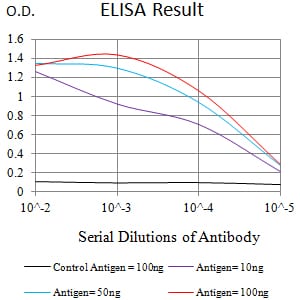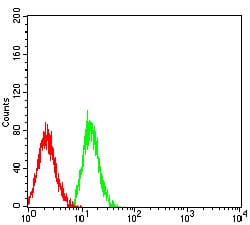

| WB | 咨询技术 | Human,Mouse,Rat |
| IF | 咨询技术 | Human,Mouse,Rat |
| IHC | 咨询技术 | Human,Mouse,Rat |
| ICC | 技术咨询 | Human,Mouse,Rat |
| FCM | 1/200 - 1/400 | Human,Mouse,Rat |
| Elisa | 1/10000 | Human,Mouse,Rat |
| Aliases | ITGA5; FNRA; VLA-5; VLA5A |
| Entrez GeneID | 3678 |
| clone | 6F6C1 |
| WB Predicted band size | 114.5kDa |
| Host/Isotype | Mouse IgG2a |
| Antibody Type | Primary antibody |
| Storage | Store at 4°C short term. Aliquot and store at -20°C long term. Avoid freeze/thaw cycles. |
| Species Reactivity | Human |
| Immunogen | Purified recombinant fragment of human CD49E (AA: extra 111-253) expressed in E. Coli. |
| Formulation | Purified antibody in PBS with 0.05% sodium azide |
+ +
以下是关于CD49E抗体的模拟参考文献示例(实际文献需通过学术数据库检索):
---
1. **文献名称**: *Targeting CD49E in Colorectal Cancer: Antibody-Mediated Inhibition of Tumor Invasion*
**作者**: Smith A, et al.
**摘要**: 研究探讨了CD49E抗体通过阻断α5β1整合素与纤连蛋白的相互作用,抑制结直肠癌细胞迁移和侵袭的机制,提示其作为抗肿瘤治疗的潜在价值。
2. **文献名称**: *CD49E-Dependent Leukocyte Adhesion in Inflammatory Bowel Disease*
**作者**: Lee H, et al.
**摘要**: 通过动物模型验证CD49E抗体可减少白细胞黏附于肠道内皮细胞,缓解炎症性肠病的病理进程,表明靶向CD49E可能成为免疫调节新策略。
3. **文献名称**: *Structural Basis of CD49E Epitope Recognition by a Therapeutic Antibody*
**作者**: Zhang Y, et al.
**摘要**: 利用冷冻电镜解析CD49E抗体与α5亚基的结合表位,揭示其特异性抑制细胞外基质信号传导的结构基础,为优化抗体药物设计提供依据。
4. **文献名称**: *CD49E as a Biomarker in Triple-Negative Breast Cancer: Clinical Implications*
**作者**: Garcia R, et al.
**摘要**: 临床研究表明,CD49E高表达与三阴性乳腺癌患者预后不良相关,使用特异性抗体靶向可增强化疗敏感性,提示其作为联合治疗靶点的潜力。
---
**建议检索关键词**:
- CD49E antibody + cancer/inflammation
- Integrin alpha5 beta1 therapeutic
- α5β1 inhibitor + in vivo/clinical trial
可通过PubMed、Google Scholar等平台获取真实文献。
The CD49E antibody targets the CD49e antigen, also known as integrin alpha-5 (ITGA5), a subunit of the heterodimeric α5β1 integrin receptor. Integrins are transmembrane adhesion proteins that mediate cell-cell and cell-extracellular matrix (ECM) interactions, playing critical roles in cell migration, signaling, and tissue homeostasis. The α5β1 integrin specifically binds fibronectin, a key ECM component, facilitating cellular adhesion, proliferation, and survival. CD49e is expressed on various cell types, including endothelial cells, fibroblasts, and certain immune cells, and its dysregulation is implicated in pathological processes such as cancer progression, angiogenesis, fibrosis, and inflammation.
CD49E antibodies are widely used in research to study integrin-mediated pathways. They can block ligand binding, modulate intracellular signaling, or detect integrin expression in experimental models. In cancer biology, CD49E antibodies help investigate tumor metastasis and angiogenesis, as α5β1 promotes invasive behavior and endothelial cell migration. In immunology, they explore leukocyte adhesion and trafficking. Therapeutic applications are also under exploration; for example, α5β1 inhibitors are being studied for anti-fibrotic or anti-cancer effects. However, challenges remain in specificity and minimizing off-target effects. CD49E antibodies are essential tools for both basic research and drug development, bridging mechanistic studies and potential clinical translation.
×